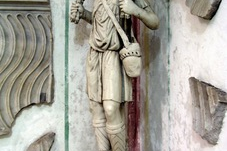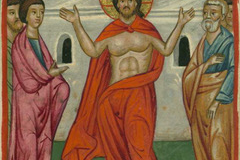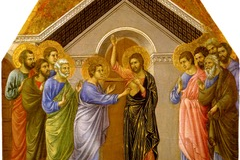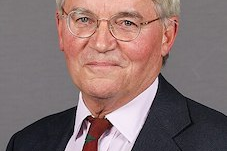Sunday Reflection with Fr Terry: 19 February 2012
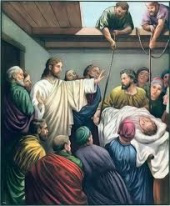
Children love the story of the man lowered down through the roof to be healed by Jesus. With their vivid imaginations, they imagine the scene (Mk. 2.1-12). The dust and debris falling on the people below. The excited and bewildered shouts of the onlookers. The drama of the stretcher slowly being lowered. Sweat on the faces of the men lowering it, struggling to keep the stretcher level. Children also imagine the fury of the houseowner, who surely must have been cross at being left with a hole in the roof.
The children are right. There is drama in this incident. But there is also a puzzle. Why does Jesus say to the paralysed man, 'Your sins are forgiven'? It is healing that is being sought by the man and his stalwart friends, not forgiveness. It might even seem that Jesus was saying that the paralysis was the result of the man's sin, blaming him, even. Yet this would not sit easily with what we know of Jesus from elsewhere in the gospels - for example, he declines to blame the blindness of the man born blind on him or his family (John 9.1-3). So what is happening here?
Paralysis takes many forms. It can be physical, the result of a neurological illness like MS or Motor Neurone Disease. Or it can be mental, the result of fear or guilt, sometimes compounded by addiction to cope with pain. There can be paralysis of the body and paralysis of the will, in which a person sometimes ceases to look after themselves properly. Either way, it is debilitating, but I think that here we are to understand paralysis as a mental illness which has so affected the man's body as to leave him chronically weak and unable to help himself. Perhaps some tragic mistake or selfish behaviour in the past had left him wracked with guilt and remorse and unable to function. Perhaps it was something very different, an exaggerated sense of his sinfulness which has left him prone to scrupulosity and paralysed with fear. Whatever it is, Jesus reads his soul, and speaks the word he needs to hear. Before even a word is spoken, Jesus assures him of God's mercy. We see and we hear the divine generosity in action. I wonder: what does Jesus say to each of us, what word does he speak, that we need to hear?
There is something else. In verse 5 it says that Jesus 'seeing their faith' decided to act. The paralytic had four friends, or relatives, or perhaps even servants, but they were determined to help him. Whenever I visit a hospital, I see the patients accompanied by relatives or friends. In times of illness, to be accompanied by those who show love and concern, who will speak up for you if necessary to the doctors and nurses - this too is part of healing. We remember Jesus telling us that when we visit the sick, we visit him too. The paralysed man had four friends who brought him to the divine healer in faith and hope and love. The man needed a word of hope, something that would cut through his misery and give him something to cling to. Jesus spoke a freeing word. Not only in the forgiveness, but in the challenge to take his bedding and go. This challenge tells the man that Jesus believes he has the inner resources to do this. Jesus believes that the paralytic can summon the energy that is necessary, banish doubts, and stand up in front of all these sceptical people. Jesus gives a challenge, and the man rises to it. Jesus has set him free.
Fr Terry is Parish Priest at St Mary's in Finchley East, north London. Fr Terry's latest book: Ronald Knox and English Catholicism is published by Gracewing at £12.99 and is available on Amazon, on ICN's front page. To read Sr Gemma Simmonds' review on ICN see: www.indcatholicnews.com/news.php?viewStory=1611



